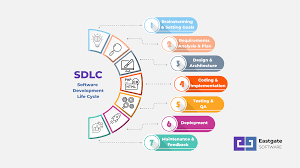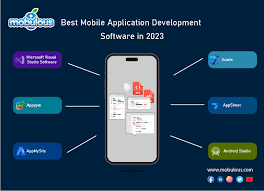Mastering the Full Software Development Life Cycle (SDLC): A Comprehensive Guide
The Full Software Development Life Cycle (SDLC)
The Software Development Life Cycle (SDLC) is a structured process that outlines the steps needed to design, develop, test, and deploy software applications. The full SDLC encompasses all the phases involved in creating software, from the initial planning to maintenance and support.
Phases of the Full SDLC
Planning: This phase involves defining the scope of the project, setting goals, and determining resources needed.
Analysis: During this phase, requirements are gathered from stakeholders and analyzed to create a functional specification.
Design: The design phase involves creating a detailed technical design based on the requirements identified in the analysis phase.
Implementation: In this phase, developers write code according to the design specifications and integrate different components of the software.
Testing: The testing phase involves verifying that the software meets requirements and is free of bugs or errors through various testing methods.
Deployment: Once testing is complete, the software is deployed to production environments for end-users to access.
Maintenance: After deployment, ongoing maintenance is required to address issues, implement updates, and ensure optimal performance.
The Importance of Following a Full SDLC
Adhering to a full SDLC ensures that software projects are completed efficiently and effectively. By following a structured process, organizations can minimize risks, control costs, and deliver high-quality solutions that meet user needs.
In conclusion, the full Software Development Life Cycle (SDLC) provides a roadmap for successfully developing software applications from start to finish. By following each phase diligently, organizations can create reliable and innovative software products that drive business success.
9 Essential Tips for Mastering the Full Software Development Life Cycle (SDLC)
- Understand the project requirements thoroughly before starting.
- Involve stakeholders at every stage of the software development life cycle (SDLC).
- Create a detailed project plan outlining tasks, timelines, and responsibilities.
- Use version control to manage changes and track progress effectively.
- Perform thorough testing at each phase to ensure quality and identify issues early.
- Document all processes, decisions, and changes for future reference.
- Prioritize security measures throughout the SDLC to protect against vulnerabilities.
- Regularly review and evaluate the project status to make necessary adjustments.
- Seek feedback from end users to incorporate improvements and enhance user experience.
Understand the project requirements thoroughly before starting.
To ensure a successful software development project following the full Software Development Life Cycle (SDLC), it is crucial to thoroughly understand the project requirements before commencing any work. By taking the time to carefully analyze and clarify the needs and expectations of stakeholders, teams can create a solid foundation for the development process. Clear and comprehensive project requirements help in defining scope, setting achievable goals, and guiding all subsequent phases of the SDLC towards meeting user needs effectively.
Involve stakeholders at every stage of the software development life cycle (SDLC).
It is crucial to involve stakeholders at every stage of the software development life cycle (SDLC) to ensure that the final product meets their needs and expectations. By engaging stakeholders from the planning phase to deployment and maintenance, developers can gather valuable feedback, address concerns early on, and make informed decisions that align with the project goals. This collaborative approach fosters transparency, enhances communication, and ultimately leads to the successful delivery of software solutions that satisfy both business requirements and user preferences.
Create a detailed project plan outlining tasks, timelines, and responsibilities.
Creating a detailed project plan outlining tasks, timelines, and responsibilities is crucial in the full Software Development Life Cycle (SDLC). This plan serves as a roadmap for the entire development process, ensuring that all team members understand their roles and deadlines. By clearly defining tasks and responsibilities, teams can work more efficiently, minimize risks of delays or misunderstandings, and ultimately contribute to the successful completion of the project within the specified timeline.
Use version control to manage changes and track progress effectively.
Utilizing version control is crucial in the full Software Development Life Cycle (SDLC) to effectively manage changes and track progress. Version control systems like Git enable developers to keep track of modifications made to the codebase, collaborate seamlessly with team members, and revert to previous versions if needed. By implementing version control practices, development teams can maintain a structured workflow, reduce errors, and ensure that all project stakeholders are aligned throughout the software development process.
Perform thorough testing at each phase to ensure quality and identify issues early.
Performing thorough testing at each phase of the Full Software Development Life Cycle (SDLC) is crucial to ensuring quality and identifying issues early in the development process. By conducting comprehensive testing during planning, analysis, design, implementation, and deployment phases, developers can detect and address potential problems before they escalate, leading to a more robust and reliable software product. Early identification of issues through rigorous testing helps in delivering a high-quality solution that meets user requirements and minimizes the need for costly rework later in the development cycle.
Document all processes, decisions, and changes for future reference.
Documenting all processes, decisions, and changes throughout the Full Software Development Life Cycle (SDLC) is crucial for future reference and continuous improvement. By maintaining detailed documentation, teams can ensure transparency, traceability, and knowledge transfer within the project. This practice not only helps in understanding the rationale behind past decisions but also facilitates smoother transitions between project phases and team members. Ultimately, thorough documentation serves as a valuable resource for future projects, enabling teams to learn from past experiences and make informed decisions to enhance the overall development process.
Prioritize security measures throughout the SDLC to protect against vulnerabilities.
It is crucial to prioritize security measures throughout the Software Development Life Cycle (SDLC) to safeguard against vulnerabilities. By integrating security practices from the initial planning stages to deployment and maintenance, organizations can proactively identify and address potential security risks. This approach helps in creating robust and secure software solutions that protect sensitive data, prevent cyber threats, and ensure the overall integrity of the system. Emphasizing security throughout the SDLC not only enhances the reliability of the software but also instills trust among users and stakeholders.
Regularly review and evaluate the project status to make necessary adjustments.
Regularly reviewing and evaluating the project status is a crucial tip in the full Software Development Life Cycle (SDLC). By consistently assessing the progress of the project, teams can identify any potential issues or deviations from the initial plan and make necessary adjustments promptly. This proactive approach helps ensure that the project stays on track, meets its objectives, and delivers high-quality software solutions within the specified timeline and budget.
Seek feedback from end users to incorporate improvements and enhance user experience.
Seeking feedback from end users is a crucial step in the full Software Development Life Cycle (SDLC) process. By actively engaging with end users, developers can gain valuable insights into how the software is being used and identify areas for improvement. Incorporating user feedback allows for enhancements that can significantly enhance the overall user experience, leading to higher satisfaction levels and increased usability of the software. This iterative feedback loop ensures that the software aligns closely with user needs and expectations, ultimately resulting in a more successful and user-friendly product.





